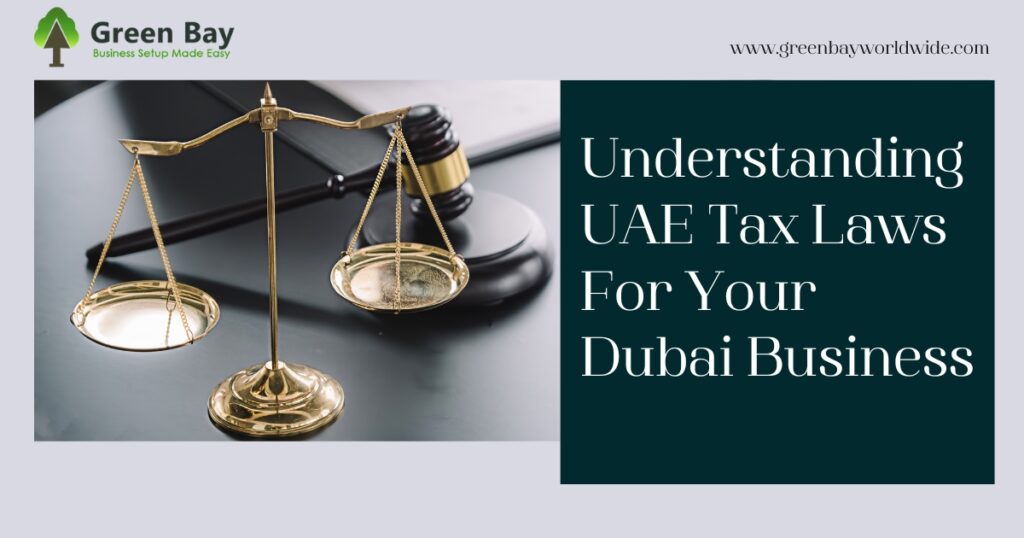
Close
Starting a business in Dubai can be an exciting venture, but understanding the UAE tax laws is crucial for ensuring your enterprise runs smoothly and complies with local regulations. The UAE offers a favorable tax environment with no personal income tax and low corporate tax rates. However, staying informed about the nuances of UAE tax laws, including Value Added Tax (VAT) and corporate tax obligations, is essential for any business owner. In this guide, we will explore the key aspects of UAE tax laws that you need to know to successfully navigate the financial landscape of Dubai.
In the United Arab Emirates (UAE), the rules and standards that regulate the imposition and collection of taxes within the nation are laid down in the form of tax laws. These laws are established by both the federal government and the local governments. The processes for registration, compliance, and reporting requirements for enterprises and people are outlined in these laws. These laws also describe the sorts of taxes that are applicable, such as the Value-Added Tax (VAT), the corporation tax, and the excise tax. While simultaneously encouraging investment and commercial endeavours in the area, the United Arab Emirates’ (UAE) tax system seeks to promote openness, justice, and economic stability. When it comes to maintaining compliance, minimising tax obligations, and optimising financial planning strategies within the legal framework given by the government authorities, it is necessary for enterprises and people to have a solid understanding of the tax laws that govern the United Arab Emirates (UAE).
The United Arab Emirates (UAE) has a legislative framework that was formed by federal and municipal authorities to control the imposition, administration, and collection of taxes within the nation. This framework is known as tax law. It comprises a wide range of taxes, such as the Value-Added Tax (VAT), the corporation tax (for certain sectors), the excise tax on particular items, and the customs charges on goods that are imported. In addition, the tax legislation of the United Arab Emirates contains laws concerning tax residency, double taxation agreements (DTAs) with other nations, tax compliance requirements, and penalties for non-compliance or failure to comply. The United Arab Emirates (UAE) tax law has as its principal purpose the promotion of an environment that is favourable to the expansion of businesses and investments inside the nation, as well as the promotion of economic stability, justice, and transparency.

In the United Arab Emirates (UAE), there is generally no federal corporate tax imposed on companies operating within the country, except for specific industries and branches of foreign banks. Here are key aspects of UAE corporate tax law:
Understanding UAE corporate tax law is essential for businesses operating in the country to ensure compliance with applicable tax regulations, optimize tax planning strategies, and manage their financial obligations effectively within the legal framework provided by UAE authorities.
A structured table summarizing key aspects of property taxes and real estate laws in the UAE:
Property Taxes:
Real Estate Laws:
Financial Obligations:
Investment Opportunities:
Consultation and Advice:
Its provides a clear overview of the key aspects related to property taxes, real estate laws, financial obligations, investment opportunities, and the importance of seeking professional consultation in navigating the UAE’s real estate market.
Here summarizing the types of tax laws in the United Arab Emirates (UAE):
Value Added Tax (VAT):
Corporate Tax:
Customs Duties:
Excise Tax:
Property Tax:
Personal Income Tax
Withholding Tax:
Double Taxation Agreements (DTAs):
Its provides a concise overview of the different types of tax laws applicable in the UAE, highlighting key aspects such as VAT, corporate tax, customs duties, excise tax, property tax, personal income tax, withholding tax, and DTAs. Understanding these tax regulations is essential for businesses and individuals to navigate the UAE’s tax environment effectively.
A significant part of the organised execution and enforcement of numerous tax legislation in the United Arab Emirates is played by the executive regulations of UAE tax law. These laws, which were painstakingly created by the Federal Tax Authority (FTA) and other relevant agencies, serve as comprehensive standards that control the application of taxes such as the Value-Added Tax (VAT), the Excise Tax, and the Corporate Tax. They include a wide variety of important features that are necessary for persons and enterprises who are operating inside the United Arab Emirates:
At the outset, they provide a detailed description of the requirements and processes involved in VAT registration, making a distinction between required thresholds and optional registrations. In order to offer clarity to taxpayers, they precisely specify the extent of taxable supply, including the specifics of exclusions and zero-rating rules.
By establishing severe standards for the production of tax invoices, credit notes, and debit notes, the laws become more stringent over time. This ensures that financial transactions are conducted in a transparent manner. In addition, they establish the dates, forms, and submission processes for VAT returns, drawing attention to the need of early compliance in order to avoid fines.
Furthermore, these rules include specialised measures for industries like as real estate and financial services, which address the distinct tax treatment that these sectors get. They provide procedures for the recovery of input VAT, which enables enterprises to properly control costs while yet being in accordance with regulations governing VAT.
When it comes to excise tax, the laws do a detailed job of defining taxable commodities. They also establish rates and exclusions in order to limit the use of products that are considered to be damaging to public health or the environment respectively.
Executive rules emphasise severe enforcement methods across the board, detailing penalties for non-compliance and underlining the necessity of precise record-keeping and proactive collaboration with tax audits. These laws address all aspects of the tax system.
Within the context of the dynamic business climate of the United Arab Emirates (UAE), the progressive character of the executive rules that make up UAE tax law guarantees a resilient framework that can adapt to the changing economic landscape. This helps to develop transparency, compliance, and fair fiscal practices.